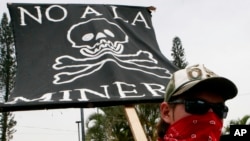El Salvador's Congress on Wednesday approved a law prohibiting all metal mining projects in a bid to protect the poor Central American country's environment and natural resources.
The new law, which enjoyed cross-party support from 70 lawmakers, blocks all exploration, extraction and processing of metals, whether in open pits or underground.
The legislation prohibits the use of toxic chemicals like cyanide and mercury, and makes permanent an executive order passed by former President Antonio Saca in 2009 and renewed by subsequent administrations.
Several regions of the country have attracted interest from international gold and silver mining companies.
In October, El Salvador won an arbitration at the World Bank's International Centre for Settlement of Investment Disputes (ICSID) against the Australian-Canadian miner OceanaGold Corp, which was seeking $250 million over the 2009 denial of an extraction permit.
In its decision, the ICSID ordered the company to pay El Salvador $8 million for legal costs.





